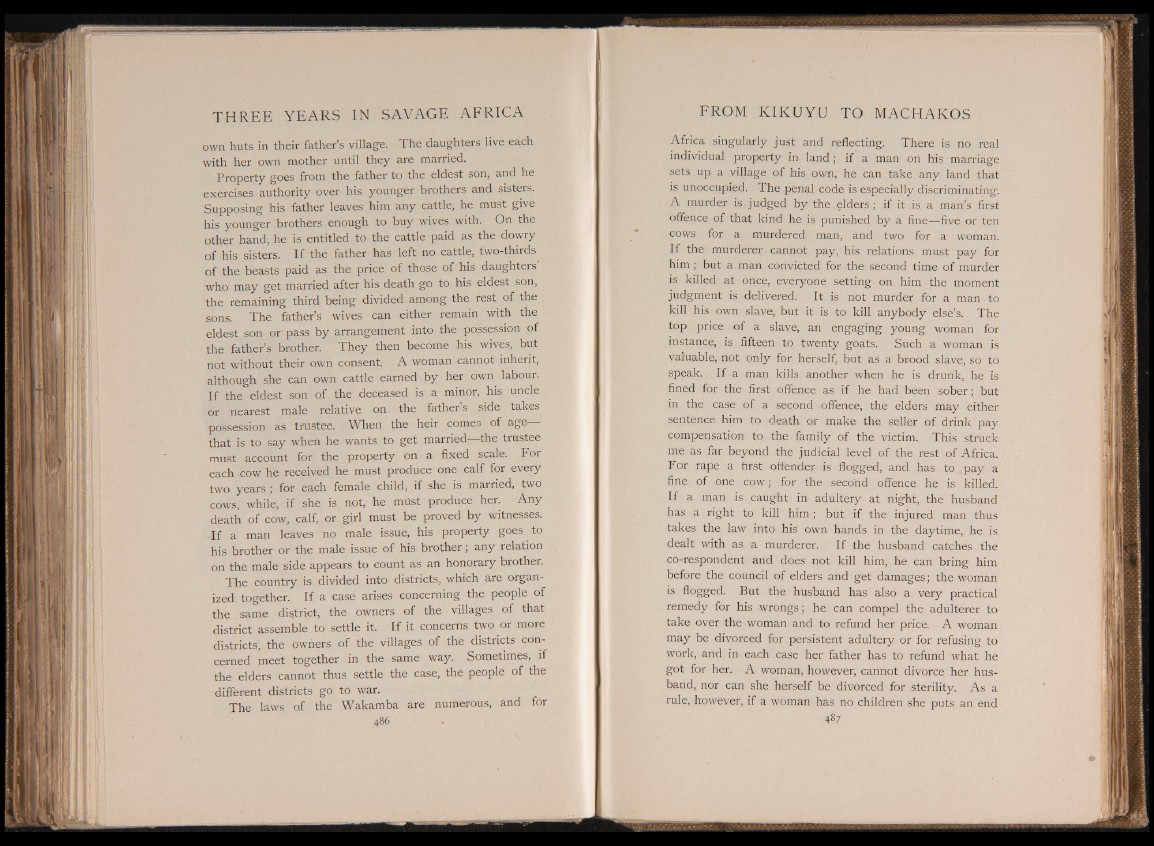
own huts in their father’s village. The daughters live each
with her own mother until they are married.
Property goes from the father to the eldest son, and he
exercises authority over his younger brothers and sisters.
Supposing his father leaves him any cattle, he must give
his younger brothers enough to buy wives with. On the
other hand, he is entitled to the cattle paid as the dowry
of his sisters. If the father has left no cattle, two-thirds^
of the beasts paid as the price of those of his daughters'
who may get married after his death go to his eldest son,
the remaining third being divided among the rest of the
sons. The father’s wives can either remain with the
eldest son or pass by arrangement into the possession of
the father’s brother. They then become his wives, but
not without their own consent. A woman cannot inherit,
although she can own cattle earned by her own labour.
If the eldest son of the deceased is a minor, his uncle
or nearest male relative on the father s side takes
possession as trustee. When the heir comes of age
that is to say when he wants to get married the trustee
must account for the property on a fixed scale. For
each cow he received he must produce one calf for every
two years ; for each female child, if she is married, two
cows, while, if she is not, he must produce her. Any
death of cow, calf, or girl must be proved by witnesses.
I f a man leaves no male issue, his property goes to
his brother or the male issue of his brother; any relation
on the male side appears to count as an honorary brother.
The country is divided into districts, which are organized
together. If a case arises concerning the people of
the same district, the owners of the villages of that
district assemble to settle it. If it concerns two or more
districts, the owners of the villages of the districts concerned
meet together in the same way. Sometimes, if
the elders cannot thus settle the case, the people of the
different districts go to war.
The laws o.f. the Wakamba are numerous, and for
486
Africa singularly just and reflecting. There is no real
individual property in land; if a man on his marriage
sets up a village of his own, he can take any land that
is unoccupied. The penal code is especially discriminating'.
A murder is judged by the elders; if it is a man’s first
offence of that kind he is punished by a fine—-five or ten
cows for a murdered man, and two for a woman.
If the murderer cannot pay, his relations must pay for
him; but a man convicted for the second time of murder
is killed at once, everyone setting on him the moment
judgment is delivered. It is not murder for a man to
kill his own slave, but it is to kill anybody else’s. The
top price of a slave, an engaging young woman for
instance, is fifteen to twenty goats. Such a woman is
valuable, not only for herself, but as a brood slave, so to
speak. If a man kills another when he is drunk, he is
fined for the first offence as if he had been sober; but
in the case of a second offence, the elders may either
sentence him to death or make the seller of drink pay
compensation to the family of the victim. This struck
me as far beyond the judicial level of the rest of Africa.
For rape a first offender is flogged, and has to .pay a
fine of one cow; for the second offence he is killed.
If a man is caught in adultery at night, the husband
has a right to kill him; but if the injured man thus
takes the law into his own hands in the daytime, he is
dealt with as a murderer. If the husband catches the
co-respondent and does not kill him, he can bring him
before the council of elders and get damages; the woman
is flogged. But the husband has also a very practical
remedy for his wrongs; he can compel the adulterer to
take over the woman and to refund her price. A woman
may be divorced for persistent adultery or for refusing to
work, and in each case her father has to refund what he
got for her. A woman, however, cannot divorce her husband,
nor can she herself be divorced for sterility. As a
rule, however, if a woman has no children she puts an end
487